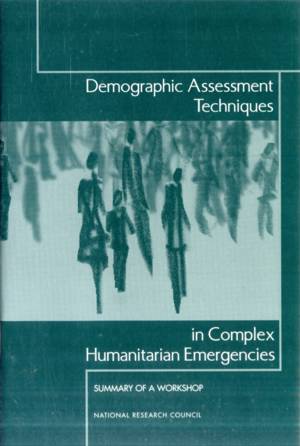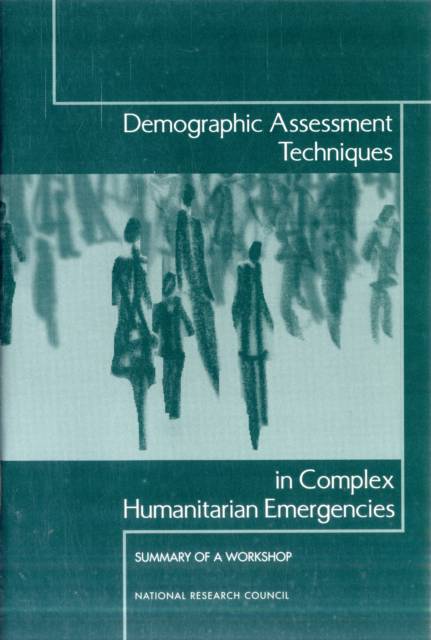
- Afhalen na 1 uur in een winkel met voorraad
- Gratis thuislevering in België vanaf € 30
- Ruim aanbod met 7 miljoen producten
- Afhalen na 1 uur in een winkel met voorraad
- Gratis thuislevering in België vanaf € 30
- Ruim aanbod met 7 miljoen producten
Zoeken
Demographic Assessment Techniques in Complex Humanitarian Emergencies
Summary of a Workshop
National Research Council, Committee on Population, Roundtable on the Demography of Forced Migration
Paperback | Engels
€ 15,45
+ 30 punten
Omschrijving
The Roundtable on the Demography of Forced Migration was established by the Committee on Population of the National Research Council in 1999. The roundtable is composed of experts from academia, government, philanthropy, and international organizations. The roundtable's purpose is to serve as an interdisciplinary, nonpartisan focal point for taking stock of what is known about demographic patterns in refugee situations, to apply this knowledge base to assist both policy makers and relief workers, and to stimulate new directions for innovation and scientific inquiry in this growing field of study.
The roundtable meets yearly and has also organized a series of workshops (held concurrently with roundtable meetings) on some of the specific aspects of the demography of refugee and refugee-like situations, including mortality patterns, demographic assessment techniques, and research ethics in complex humanitarian emergencies. This report to the Roundtable on the Demography of Forced Migration is a summary of one such workshop, which was held on September 20-21, 2000, under the aupices of the Committee on Population. The purpose of this meeting was to address a basic problem faced by all humanitarian relief agencies in an emergency: how to count the numbers of displaced persons and assess their general well-being. Workshop participants examined different methods for estimating refugee populations and their mortality rates, whether mortality was due to disease and malnutrition or human rights abuses. Demographic Assessment Techniques in Complex Humanitarian Emergencies: Summary of a Workshop explores the applicability of various methods in different types of emergency settings, how to improve existing methodologies and develop new ones, and the difficulties encountered by personnel in the field, including security, logistics, and access to a population.Specificaties
Betrokkenen
- Auteur(s):
- Uitgeverij:
Inhoud
- Aantal bladzijden:
- 34
- Taal:
- Engels
Eigenschappen
- Productcode (EAN):
- 9780309084970
- Verschijningsdatum:
- 13/09/2002
- Uitvoering:
- Paperback
- Formaat:
- Trade paperback (VS)
- Afmetingen:
- 152 mm x 229 mm
- Gewicht:
- 72 g

Alleen bij Standaard Boekhandel
+ 30 punten op je klantenkaart van Standaard Boekhandel
Beoordelingen
We publiceren alleen reviews die voldoen aan de voorwaarden voor reviews. Bekijk onze voorwaarden voor reviews.











